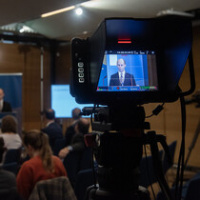- Címoldal
- Eseménynaptár
- The responsibility of Water Science for Sustaina...
The responsibility of Water Science for Sustainability
Konferencia
A regisztráció lezárult.
Időpont
2019. november 20., 13:00 óra
Helyszín
MTA Székház Felolvasóterem
1051 Budapest, Széchenyi István tér 9.
Részletek
Surface water and groundwater resources of Hungary are exceptionally rich and their conservation is an imperative responsibility for the society. This recognition lead to the development of the National Water Strategy (Kvassay Jenő Plan), the strategic framework and mid-term action plan of water management to avoid the world-threatening water crisis in Hungary and to preserve water for future generations by integrated and sustainable water management.
The effective implementation of the National Water Strategy requires – among other factors – to significantly develop the scientific background and the optimization of scientific support for sustainable water management. Therefore, the Hungarian Academy of Sciences (MTA), as the coordinator of water science research institutions, launched the National Water Science Programme (NWSP). One of the pillars of the NWSP is the elaboration of a comprehensive Hungarian Water Research Programme (HWRP) to summarize the most important water-related national challenges and research tasks.
The key resources used for the current document were: (i) relevant national strategies and other key studies; (ii) international policies, agreements and examples of national water research programmes from other countries and regions; (iii) status reports and trend analyses of scientific fields written by delegated experts; and (iv) extensive survey research. The draft programme compiled based upon the source documents was evaluated by internationally renowned experts and their proposals were incorporated into the document.
Challenges and research tasks of the document are listed in six priority areas as chapters reflecting the water-related target areas of the #6 Sustainable Development Goal: 1, Safe drinking water; 2, Water quality; 3, Sustainable water use; 4, Water management; 5, Protection and restoration of aquatic ecosystems; 6, Water-related social conflicts.
Each chapter starts with listing the most important keywords related to the priority area and ends with defining the key research tasks which result from the indicated challenges. The themes listed in the six chapters include all key areas defined by the National Water Strategy, focusing on the topics which require further research. Moreover, the document defines several other multidisciplinary research areas such as emerging pollutants (xenobiotics, plastic microparticles and antibiotics resistance), evaporation research or the expansion of invasive foreign species endangering aquatic habitats.
13:00-13:05 Introduction
András Báldi, Centre for Ecological Research
13:05-13:25 Relevance of groundwater for societal challenges: lessons from the KINDRA project, Marco Petitta, Dipartimento di Scienze Della Terra Universita' La Sapienza
13:25-13:45 New challenges for waste water treatment
Helmut Kroiss, Technische Universität Wien; Research Centre for Water Quality Management
13:45-14:05 The moisture of soil and its importance in the water cycle
Csilla Farkas, Norwegian Institute of Bioeconomy Research (NIBIO)
14:05-14:25 Freshwater Ecosystem Health: the Basis for Sustainable Water Resources Management, János Bogárdi, The University of Bonn
14:25-14:45 The potential of Earth Observation for water resources management
Lucien Hoffmann, Luxembourg Institute of Science and Technology, Department 'Environmental Research and Innovation'
14:45-15:05 Process oriented regional model selection for flood peak/volume relationships for engineering design
Jan Szolgay, Slovak University of Technology in Bratislava
15:05-15:10 Closing remarks
János Józsa, Budapest University of Technology and Economics
Kapcsolattartó
Sugár Éva (telefon: +361-411-6100/626)




